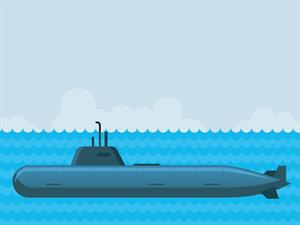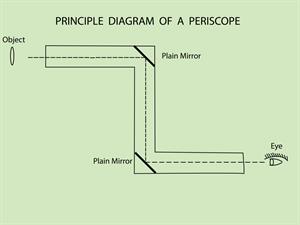
PUMPA - SMART LEARNING
எங்கள் ஆசிரியர்களுடன் 1-ஆன்-1 ஆலோசனை நேரத்தைப் பெறுங்கள். டாப்பர் ஆவதற்கு நாங்கள் பயிற்சி அளிப்போம்
Book Free DemoA Periscope is an instrument used to observe over, around or through an object, obstacle or environmental condition that prevents direct line-of-sight observation from an observer's current position.
Hippolyte Marie-Davy invented the first naval periscope in 1854, which contains a vertical tube with two small mirrors fixed at each end at 45°. Simon Lake used periscopes in his submarines in 1902.

It is an instrument used for observing bodies or ships, which are over and around another body or a submarine.
It works on the principle of the law of reflection of light. It contains a long outer case, and inside this case, mirrors or prisms are placed at each end with an inclination angle of 45°.

Light coming from the distant body strikes the mirror at the top end of the periscope, and it gets reflected vertically downward. This light is reflected again by the next mirror placed at the bottom to move horizontally and reach the observer's eye.
In some complex periscopes, optic fibre is used preferably over mirrors for achieving a higher resolution. The distance between the mirrors varies mainly depends on the purpose.
Uses:
- It is used in warfare and navigation of the submarine.
- In the military, it is used for pointing and firing guns from a ‘bunker’.
- We can take photographs of important places through periscopes without trespassing restricted military regions.
- Doctors use fibre optic periscopes as endoscopes to view internal organs of the body.